How to calm anxiety
If you have anxiety, it can be difficult to keep your mind at ease daily. Add a global pandemic, like Covid-19, and you may feel even more helpless or on edge. Whether you have been diagnosed with anxiety or if you’re deeply worried about a particular situation, it can be challenging to find ways to calm anxiety. However, when your mind is racing with your stressors and fears, it helps to take a deep breath and repeat a mantra, according to mental health experts.
To stop anxious thoughts and feel more in control, check out these phrases you can say to yourself to calm your anxiety.

Take a cue from Nike
Get past your current state and start calming anxiety by being proactive. Even if it doesn’t have the perfect outcome, at least you’re moving away from the anxiety of trying to figure out your next step. “There’s no wrong decision, as long as you do something to move out of deliberation mode,” says Debra Kissen, clinical director of Light on Anxiety Treatment Center in Chicago. “Stop trying to find the perfect solution and just take some movement forward, even if it’s an imperfect step forward.” (Beware of the signs of high functioning anxiety.)
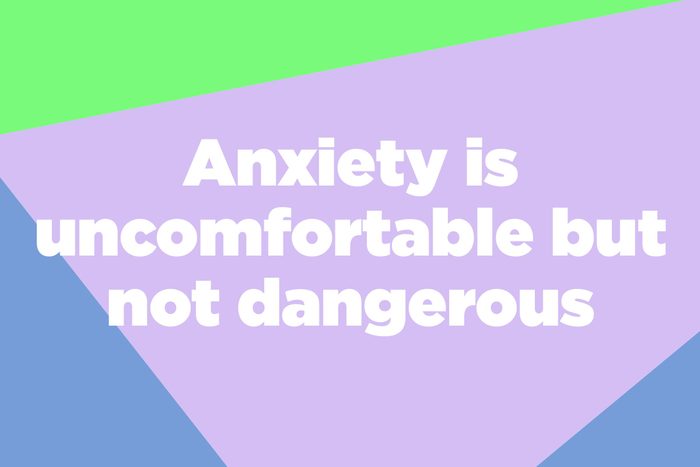
Give yourself a reality check
Remind yourself that although anxiety is unpleasant, you’re in no physical danger when your emotions are taking over. “In a moment of anxiety, especially with panic disorder, people feel like ‘I’m not going to survive this. This is not OK to feel this way,’” Kissen says. “It’s not fun, but it’s not dangerous.” These are things to never say to someone with anxiety.

Go for gratitude
Take a moment to appreciate your good health, loving family, or stable job. Your brain can’t experience stress and gratitude at the same time, so it’s an effective way to change your mindset, says Heidi Hanna, PhD, author of Stressaholic: 5 Steps to Transform Your Relationship with Stress. “When you feel stressed or brain fog, if you can shift to a place of expressing gratitude for something in life, that immediately starts to shift into a more restorative state,” she says. “If your mind wanders, go back to feeling grateful.”

Practice mindfulness
A helpful tip for how to calm anxiety: be in the present and be in the now. Calming anxiety in this way can help you stay in the moment, rather than stressing out about all your worries and regrets. Notice your thoughts and sensations as they come, and shift them back to what’s happening in the present moment. Focusing on watching your kids or washing the dishes will keep your thoughts in a more bearable state. “It’s having the ability to redirect them—rather than getting totally caught up in rumination—and putting your attention to whatever the current moment has,” says Kissen. (Try one of these anxiety home remedies for relief.)
People will use “rooting” techniques to help them feel more rooted in their physical existence in the current moment. These include doing things like identifying things that you are seeing, hearing, feeling, smelling, etc at that point in time. (Check out these mental health books therapists read and loved.)

Give in
When you feel overwhelmed by things you can’t control in the moment—like politics or global warming—calming anxiety isn’t always easy. Accept that bad things happen and give yourself up to the course of the day. “It’s the nicest thing because you’re not trying to manage anything anymore,” says Kathleen Hall, founder and CEO of Mindful Living Network and The Stress Institute. “It’s like hitting the delete button.” (Try these therapist tricks to deal with anxiety.)
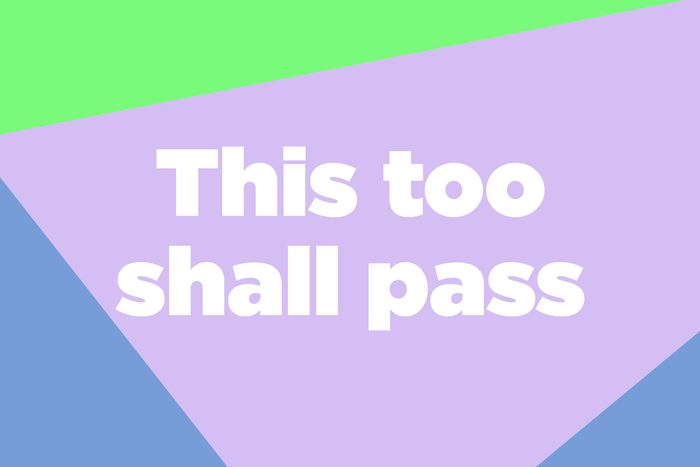
It will go away
When you’re feeling completely overwhelmed, reminding yourself that anxiety is fleeting is actually an effective method for how to calm your anxiety. “When you are chronically stressed, it can feel like you are drowning in problems and are barely staying afloat,” says Aarti Gupta, PsyD, clinical director of anxiety and family therapy center TherapyNest in Palo Alto, California. “Reminding yourself that the stressor is not permanent can provide peace of mind and grant the energy required to tackle the problem and explore viable solutions.” (Find out how you can get sick from stress.)

Give yourself a pep talk
By referring to yourself in the second person, it’s like you’re calling in a team of family members, mentors, and other loved ones to remind you that you’re not alone and that calming anxiety is possible. “When you say ‘I can do it,’ it stresses you out a little bit because you’re alone,” Hall says. “Second-person works because you’re calling yourself to action.”
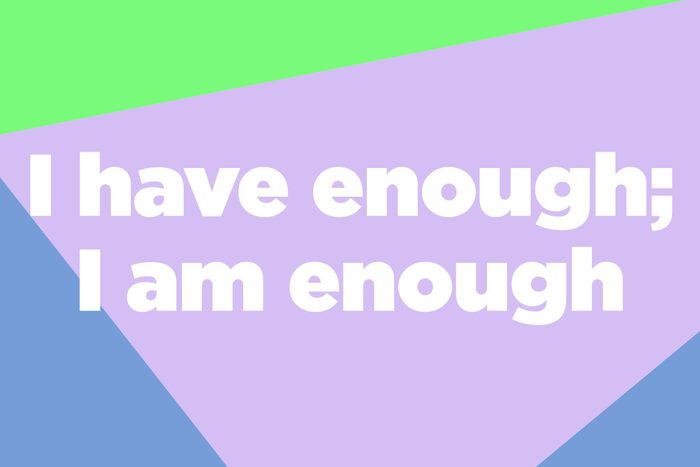
Focus on “enough”
Say the first part while taking in a big gulp of air, and follow with the second one as you exhale. The stress response often starts when people feel like they don’t have the resources to deal with the demands being put on them, says Hanna. “People are constantly told they’re not enough. We need to buy more or do more to be enough, to have enough,” she says. “It’s letting go and relaxing in the moment, saying ‘I’m exactly where I’m supposed to be in this moment.’” (Don’t miss these weird reasons you could be feeling anxious.)

Recognize your panic
By definition, anxiety means you’re feeling overwhelmed by a stressor, even when you’re in no immediate danger. “It’s like being in a building with a fire alarm going off, but there’s no fire,” says Kissen. Calm yourself down by recognizing that there’s no need to panic. (Identify the everyday habits that could actually be panic attack triggers.)
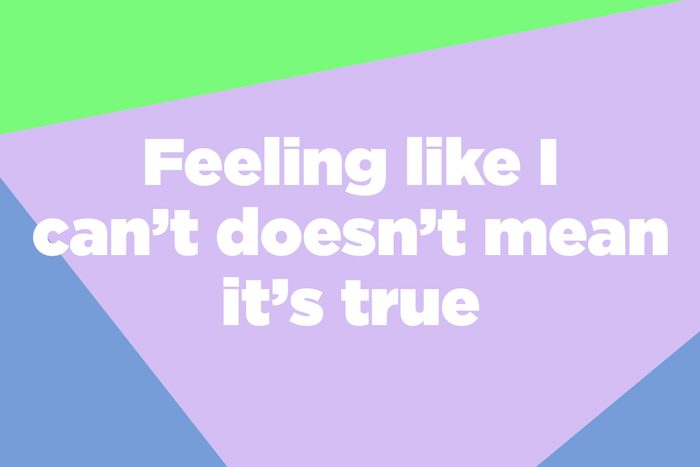
Fact-check yourself
Say you’re walking up to a party and don’t think you can handle a crowd, or are about to make a speech when you’re prone to stage fright. Empower yourself with a reminder that your fears don’t define you. “If you explore your history, chances are you had that feeling a million times, and that situation ended up being OK,” says Dr. Kissen. (Here are more tricks for how to calm social anxiety.)

Go for positivity
Sub out “loving” for any word that you feel describes you when you’re being your best self. Now close your eyes and think about how it feels when you’re embodying that trait, says Hanna. Use those values and feelings to guide you before you start your day so that you can react in a way you’re proud of. “We get so focused on needing to do stuff all the time that we forget how we want to be,” says Hanna. If you’re having trouble thinking of a word, consider the compliments you’d like to hear from others. That mindset will help you figure out what matters most to you, she says. (Check out these other ways to treat anxiety without medication.)

Think about the upside
Think of “every obstacle is an opportunity,” says Hall, about how to calm anxiety during tough times. Try to see your problems as a chance for you to learn and grow, rather than focusing on the potential negative outcomes. (Here are six steps to adopt a positive attitude.)
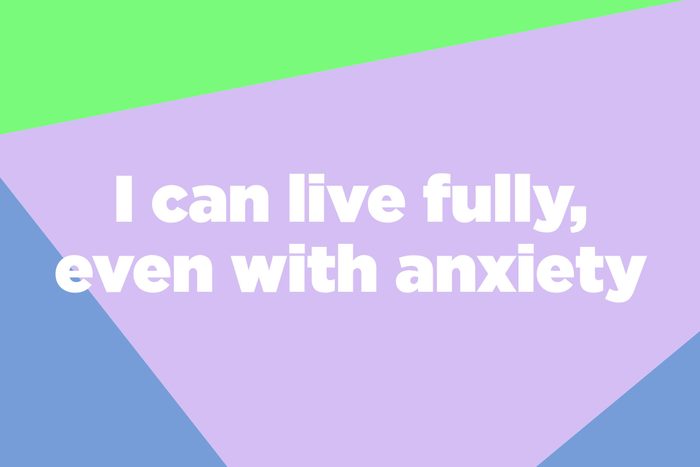
Embrace your emotions
Don’t let anxiety debilitate you. Attend a football game or go on a date, even if you have to take a bit of anxiety along with the ride. “As I’m waiting to not feel uncomfortable or out of danger, I’m not living life to its fullest,” says Kissen. “You don’t need to be anxiety-free to live.”
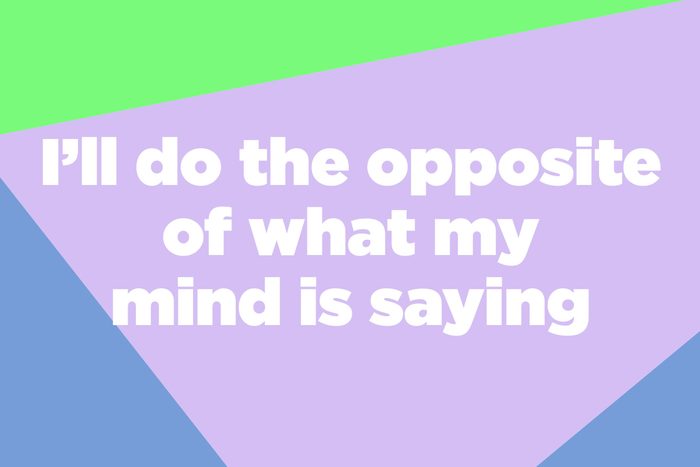
Be defiant
When anxiety is keeping you away from a social activity or important presentation, put yourself back in control by doing the opposite of what your mind is trying to convince you. “You’ll win, and anxiety will lose,” says Kissen. (Next, check out these other tips for managing anxiety and panic disorder.)
